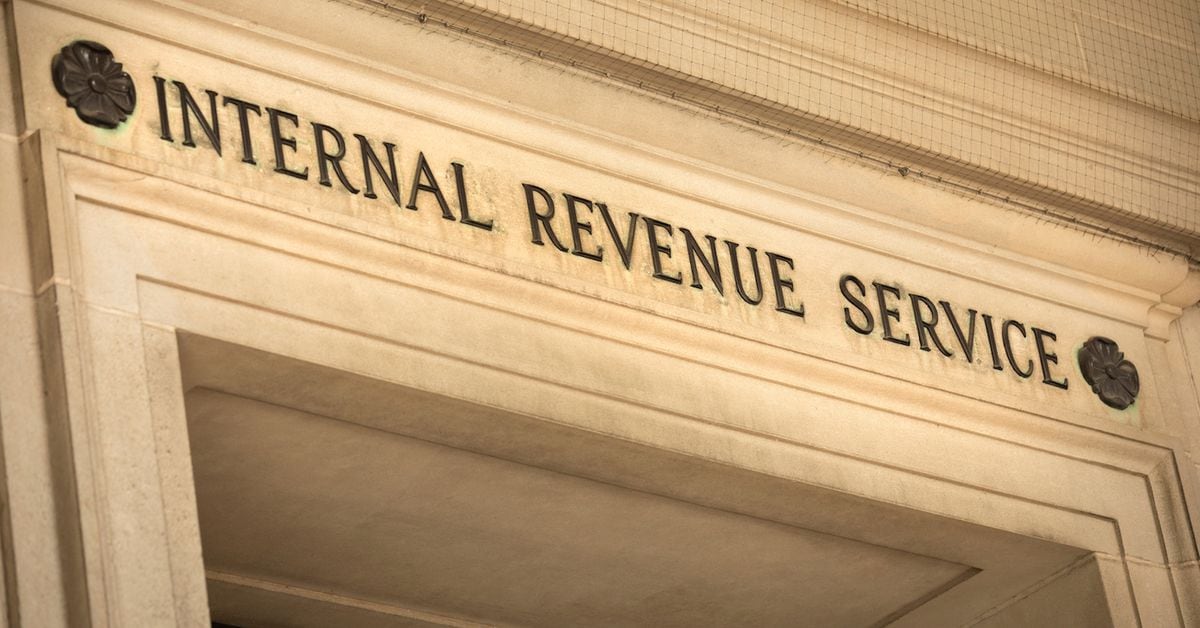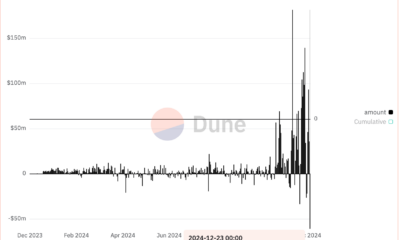IRS
IRS Shares New Crypto Tax Form, Invites Industry Input
Published
5 months agoon
By
admin

The U.S. Internal Revenue Service (IRS) has released an updated draft version of the tax form crypto brokers and investors will use to report proceeds from certain transactions, the 1099-DA.
Source link
You may like


BTC Risks Falling To $20K If This Happens


Most Layer 2 solutions are still struggling with scalability


Here’s why Stellar Price Could Go Parabolic Soon


Perp-Focused HyperLiquid Experiences Record $60M in USDC Net Outflows


Experts say these 3 altcoins will rally 3,000% soon, and XRP isn’t one of them


Robert Kiyosaki Hints At Economic Depression Ahead, What It Means For BTC?
24/7 Cryptocurrency News
US IRS Faces New Lawsuit Over Crypto Staking Tax Policy
Published
2 months agoon
October 10, 2024By
admin
The US Internal Revenue Service (IRS) is again under legal pressure in relation to taxation of cryptocurrency staking rewards. On October 10, 2024, Josh Jarrett filed a new lawsuit with support of Coin Center and against the agency’s approach of taxing block rewards as income at the time of receipt.
US IRS Faces New Lawsuit Over Crypto Staking Tax
In a filing on Thursday, the IRS is in the spotlight over its position on block rewards, which are newly minted tokens of a cryptocurrency given to validators who add blocks to a blockchain. The agency currently considers these rewards taxable income at the moment they are received, a policy that Jarrett and Coin Center argue is unjust.
The lawsuit states that the block rewards should be considered new property and should not be taxed as income, and such income should only be taxed when sold or exchanged for cash.
According to Jarrett, the same should apply to other forms of newly created property, for example crops or minerals, which are taxed only when sold. The lawsuit alleges that taxing staking rewards before they are sold leads to overtaxation and places additional and unnecessary regulatory burdens on cryptocurrency node operators.
Previous Attempts to Challenge Policy
This lawsuit is Jarrett’s second shot at trying to sue the IRS for its position on the taxation of staking rewards. He filed another similar case in 2021 when the IRS failed to explain how staking rewards are taxed. The US IRS issued a refund to Jarrett for the previous year’s tax payment but offered no instruction for subsequent tax years.
Instead, in 2023, the agency came out with new guidelines stating that staking rewards would be considered as income when received, in contrast to the refund decision.
Jarrett relies on the Tezos network where validators receive new tokens for the purpose of validating transaction. By the end of the year 2020, he got around 13,000 Tezos tokens through staking. He points out that such tokens must not be considered as income at the moment they are received, as they are new property that cannot be considered as earnings until they are sold.
The current Internal Revenue Service stance on taxing staking rewards affects many bitcoin users and those using other cryptocurrencies that use the proof-of-stake system such as Tezos. The lawsuit points out that the policy is cumbersome to the taxpayers, who are forced to value every reward they acquire for the purpose of the policy regardless of their plans to sell it.
Legislative Efforts and IRS Policy Changes
Concerns have been raised that this treatment is anti-competitive and hinders the deployment of the decentralized networks and innovation. In the networks where a large number of users are engaged in staking, the revenue from staking is split among many stakeholders, thus it is less reasonable to tax the entire value of the newly created tokens as an income.
This move has been made at a time when there is still a debate on the correct legal framework that should govern taxation of digital currencies. In the first half of 2024, a bill that was proposed before the House of Representatives stated that taxes on staking rewards would only be applied when the tokens are sold.
The lawsuit will seek to make the US IRS change its policy before the legislative process to make it more reasonable.
Moreover, from 2025, the Internal Revenue Service will impose new information reporting obligations on crypto brokers, including exchanges, and other providers of wallets to report customer transactions and gains. These rules will encompass high-value non-fungible tokens (NFTs) and specific stablecoins transactions, which will extend the taxation of digital asset transactions.
Kelvin Munene Murithi
Kelvin is a distinguished writer with expertise in crypto and finance, holding a Bachelor’s degree in Actuarial Science. Known for his incisive analysis and insightful content, he possesses a strong command of English and excels in conducting thorough research and delivering timely cryptocurrency market updates.
Disclaimer: The presented content may include the personal opinion of the author and is subject to market condition. Do your market research before investing in cryptocurrencies. The author or the publication does not hold any responsibility for your personal financial loss.
Source link
cryptocurrency
IRS lightens crypto reporting requirements for tax filings
Published
4 months agoon
August 11, 2024By
admin

The Internal Revenue Service has simplified the reporting requirements in the latest iteration of Form 1099-DA, which crypto brokers and taxpayers will use to report digital asset transactions.
According to the Aug. 9 update, the new draft has removed several requirements that were part of the April version when the IRS first introduced the form.
Taxpayers are no longer required to provide information about wallet addresses and transaction IDs, along with the exact time of day for each transaction, requiring only the date. This revision comes in response to feedback from the cryptocurrency industry.
In April, the IRS first unveiled the draft Form 1099-DA, which not only required detailed transaction information but also mandated that brokers disclose whether they were kiosk operators, digital asset payment processors, hosted wallet providers, unhosted wallet providers, or “others.”
The draft was met with criticism, particularly for listing unhosted wallet providers as brokers. Critics pointed out that these providers do not have access to the nature of transactions or the identities of the parties involved.
I don’t think crypto will be pseudo-anonymous or privacy-preserving anymore, at least in the US.
Yesterday, the IRS issued the long-awaited draft Form 1099-DA, the first tax form specifically designed to collect your ID and detailed transaction data at scale from “brokers”.… pic.twitter.com/H4aTtm5fp9
— Shehan (@TheCryptoCPA) April 19, 2024
The latest update eliminates the requirement for taxpayers to specify the “broker type,” along with the other changes, to better align with the realities of the digital asset industry.
The crypto community welcomed the change, with some calling it a step in the right direction.
Attorney Drew Hinkes from the law firm K&L Gates described the updated form as “massively improved” because it requires “considerably less” data reporting.
The Blockchain Association, an industry advocacy group, had previously warned that the earlier requirements could have led to up to $254 billion in compliance costs.
If approved, the form is expected to take effect in the 2025 tax year, with filings due in April 2026. The IRS has also invited public comments on the draft form within 30 days.
Form 1099-DA originally stems from reporting rules proposed by the IRS and the Treasury Department in August 2023 as part of the Infrastructure Investment and Jobs Act passed in 2021. The idea was to treat crypto brokers like their traditional counterparts.
IRS Commissioner Danny Werfel said at the time that the rules were designed to close the tax gap and ensure consistent tax treatment across different asset classes.
The proposal’s definition of brokers was broad, including trading platforms, payment processors, and certain hosted wallets. Decentralized exchanges were also included in the reporting requirements.
Back then, the Treasury explained that the key issue wasn’t how a platform operate but ensuring that all digital asset transactions are reported, regardless of the platform.
Critics in the crypto sector were quick to raise concerns over the potential impact on defi platforms like Uniswap. Subsequently, in a final draft released in June 2024, decentralized exchanges and self-custody wallets were exempt from the reporting requirements.
Source link

BTC Risks Falling To $20K If This Happens

Most Layer 2 solutions are still struggling with scalability

Here’s why Stellar Price Could Go Parabolic Soon

Perp-Focused HyperLiquid Experiences Record $60M in USDC Net Outflows

Experts say these 3 altcoins will rally 3,000% soon, and XRP isn’t one of them

Robert Kiyosaki Hints At Economic Depression Ahead, What It Means For BTC?

BNB Steadies Above Support: Will Bullish Momentum Return?

Metaplanet makes largest Bitcoin bet, acquires nearly 620 BTC

Tron’s Justin Sun Offloads 50% ETH Holdings, Ethereum Price Crash Imminent?

Investors bet on this $0.0013 token destined to leave Cardano and Shiba Inu behind

End of Altcoin Season? Glassnode Co-Founders Warn Alts in Danger of Lagging Behind After Last Week’s Correction

Can Pi Network Price Triple Before 2024 Ends?

XRP’s $5, $10 goals are trending, but this altcoin with 7,400% potential takes the spotlight

CryptoQuant Hails Binance Reserve Amid High Leverage Trading

Trump Picks Bo Hines to Lead Presidential Crypto Council
182267361726451435

Why Did Trump Change His Mind on Bitcoin?

Top Crypto News Headlines of The Week

New U.S. president must bring clarity to crypto regulation, analyst says

Will XRP Price Defend $0.5 Support If SEC Decides to Appeal?

Bitcoin Open-Source Development Takes The Stage In Nashville

Ethereum, Solana touch key levels as Bitcoin spikes

Bitcoin 20% Surge In 3 Weeks Teases Record-Breaking Potential

Ethereum Crash A Buying Opportunity? This Whale Thinks So

Shiba Inu Price Slips 4% as 3500% Burn Rate Surge Fails to Halt Correction

Washington financial watchdog warns of scam involving fake crypto ‘professors’

‘Hamster Kombat’ Airdrop Delayed as Pre-Market Trading for Telegram Game Expands

Citigroup Executive Steps Down To Explore Crypto
Mostbet Güvenilir Mi – Casino Bonus 2024

NoOnes Bitcoin Philosophy: Everyone Eats
Trending

 3 months ago
3 months ago182267361726451435

 Donald Trump5 months ago
Donald Trump5 months agoWhy Did Trump Change His Mind on Bitcoin?

 24/7 Cryptocurrency News4 months ago
24/7 Cryptocurrency News4 months agoTop Crypto News Headlines of The Week

 News4 months ago
News4 months agoNew U.S. president must bring clarity to crypto regulation, analyst says

 Price analysis4 months ago
Price analysis4 months agoWill XRP Price Defend $0.5 Support If SEC Decides to Appeal?

 Opinion5 months ago
Opinion5 months agoBitcoin Open-Source Development Takes The Stage In Nashville

 Bitcoin5 months ago
Bitcoin5 months agoEthereum, Solana touch key levels as Bitcoin spikes

 Bitcoin5 months ago
Bitcoin5 months agoBitcoin 20% Surge In 3 Weeks Teases Record-Breaking Potential



✓ Share: